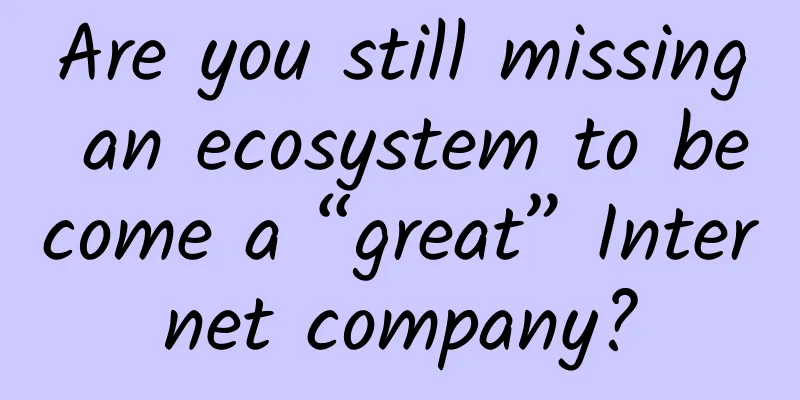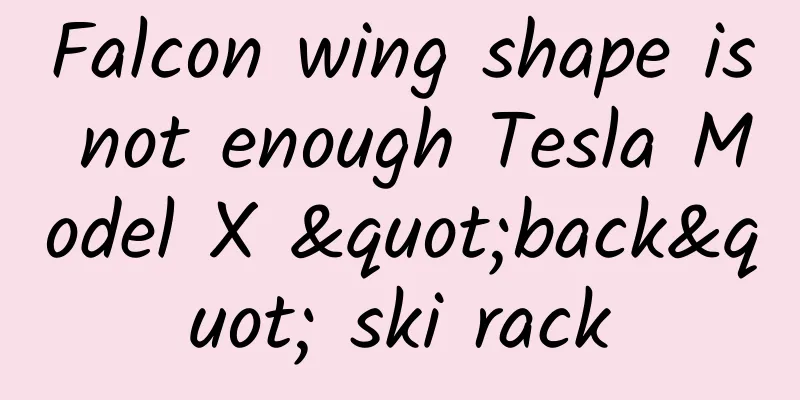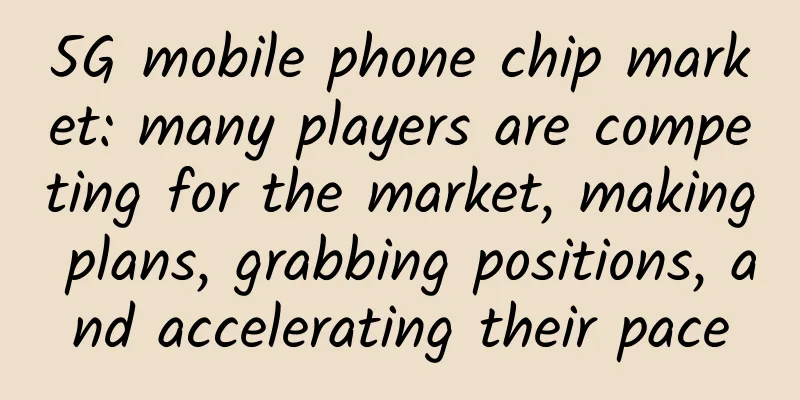Are you still missing an ecosystem to become a “great” Internet company?

|
Is it reliable for startups to build their own ecosystems? What is the essence of an ecosystem? Is it a good thing for startups to build their own ecosystems if they are jealous of Jia Yueting's LeEco ecosystem? In fact, dialectically speaking, the concept of ecosystem, apart from being a simple storytelling device and a conceptual play on ecological feedback, building your own ecosystem does not seem to be a very good thing. From creating traffic portal to ecosystem The concept of "ecosystem" comes from biology, but for domestic Internet companies that are good at breaking boundaries, "Internet + ecosystem" is definitely not an imported product, but is completely Made in China. The first person to introduce the concept of "ecosystem" into the Internet industry has disappeared, but the person who established the concept of "ecosystem" as an "internal skill" and made it a temporary phenomenon must be Jia Yueting, the founder of LeTV, who is currently at the center of controversy. But this was not the case when mobile Internet first emerged in 2010. At this time, Baidu was still focusing on the Symbian system, and WeChat was still in internal closed beta testing. Alibaba, which was based in the south of the Yangtze River, had raked in 5.557 billion yuan, with a revenue surge of 43.4%, and started the world war of e-commerce with Amazon. It was not until the iPhone 4 came like a magic weapon that these former "little giants" suddenly woke up, and suddenly, like a spring breeze, Apple and Android were everywhere. How powerful is the iPhone 4? In the era when Nokia dominated, the iPhone 4 earned an astonishing 40% of the global mobile phone profits in its first year on the market, while Android-based HTC, Motorola, and Samsung took 30.8% of the profits. Symbian, represented by Nokia, was already in decline in both profits and market share. The Internet industry always follows the traffic trailing effect. In essence, the rise of smart phones represents the arrival of a new traffic entrance, and the scale of this traffic is even more exciting than that of the PC side. Hardware-driven software became inevitable, and the business logic before 2012 became a battle for entry regardless of cost. The general pattern can be summarized as follows:
That is: after the underlying traffic is concentrated on smartphones, it is gathered in the high-frequency use of mobile applications, then collected into the application market, and then distributed to the branch products of Internet companies. In fact, this has already taken shape as the prototype of an "ecosystem". Therefore, after 2010, BAT spent a lot of money to develop the application market in order to seize new traffic entrances, including Baidu's acquisition of 91, which was the largest Internet acquisition at that time, with a price of 1.85 billion. Of course, Baidu had already established its own "Mobile Business Group" and renamed its "Baidu Mobile Application" to "Baidu Mobile Assistant" (although it is still not very popular now, but Robin Li attached great importance to this project at that time). In addition, its competitors 360 Mobile Assistant and Tencent App Store, the former launched its own "Dandelion Entrepreneurship Plan" and proposed "no profit sharing below 500,000 yuan", while the latter stated that "game app stores with revenue of less than one million yuan in the first three months will not participate in profit sharing", both of which demonstrate the giants' urgent control over the "entrance". In addition, there are also mid- and long-tail application markets such as Anzhi, Wandoujia, and Apple Mobile Assistant that have emerged at the same time. BAT's creation of the entrance and the corresponding "moat" are more like the current concept of "ecosystem". In order to better harvest the entrance traffic, the application market is just a medium, leaving aside the "black technology" of downloading "free traffic" that has become their standard in 2013. The "moat" that BAT hopes to build is an upgrade of the prototype of traffic distribution. Generally speaking, this moat consists of three parts: users, developers, and application market. On this basis, a complete ecosystem integrating the user circle, developer circle, and application market circle is extended. This ecological model has been imitated by countless startups since then. TO VC/PE's "Ecosystem" If the moat ecological model built for the competition for entry is still reasonable, then 13 years later with the arrival of the Internet entrepreneurship wave, the ecosystem has become a money-making tool for startups. "Product-based companies are worth 10 billion US dollars, platform-based companies are worth 10 billion US dollars, and ecosystem-based companies are worth 100 billion US dollars!" has become a popular saying in VC/PE. A well-known photo social APP (name not disclosed), after receiving tens of millions of yuan in Series A financing from Alibaba, should have continued to polish its products and deepen user operations in order to build a future profit model and consolidate investor confidence. However, in fact, on the contrary, in order to quickly find a Series B round (within 1 year), the founder proposed that the APP should build its own social ecosystem - APP core user circle, illustrator circle, and developer circle (SDK is released to developers). The three circles are integrated and mutually beneficial. The product valuation under the overall ecosystem is at least 100 million yuan, but the result is not always good. The same goes for another product that has been engaged in VR for a long time. Just after receiving the angel round of investment, it has been committed to creating a VR ecosystem and building a VR ecological empire. They are more "pragmatic" and have proposed a five-circle integration that is epoch-making, namely: VR mobile phones, VR TVs, VR computers, VR social networking, and VR e-commerce, five major sectors with a valuation of 1 billion US dollars. But after all, everyone wants to be LeEco, but you are not Jia Yueting. Ecosystem has become a standard for entrepreneurs to tell stories to capital. If you don’t think about it carefully, you will think that such an ecosystem is indeed very imaginative. However, the "ecosystem" mentioned by startups has a very fatal logical error, namely: it lacks scenarios based on the product itself and a visual business path. The above examples and other startups mentioned in the ecosystem construction are obviously insufficient in these two areas. LeEco is just an isolated case and can be regarded as a black swan event. Every time Jia Yueting announced a LeEco ecosystem sector, the stock price doubled, which is unique in the development process of BAT. Before the suspension: *In the 31 trading days of 2015, LeTV's stock price hit the daily limit seven times. Its closing price of 84.89 yuan yesterday was nearly 190% higher than that on December 23 last year. LeTV's latest market value has reached 71.4 billion yuan, ranking first on the ChiNext. During this period, LeTV only released mobile phones and super cars that were still in the concept stage. Therefore, the only ecosystem that is effective in attracting investors is LeEco (but it seems that it is not so beneficial at present). Startups should think carefully about the usage scenarios and visualized business paths of their products. The essence of the “ecosphere” In fact, as far as the real economy is concerned, the essence of the "ecosystem" should be the diversification strategy of enterprises, the horizontal integration of industries, and the business transformation of traditional enterprises. Its manifestation should not be limited to storytelling, but the cross-field and diversified development of enterprises through mergers and acquisitions. Data shows that among the M&A transactions in 2015, the cases of diversification strategy suddenly soared from 81 in 2014 to 299 in 2015, surpassing horizontal integration for the first time to become the most common transaction. At the same time, the transaction amount disclosed by the listed companies in 2015 for the purpose of diversification strategy reached 513.767 billion yuan, exceeding the sum of horizontal integration, industry integration and business transformation. This confirms a truth from another aspect that the composition of the current "ecosystem" is not just a simple superposition of business segments, but should be centered around more substantial purposes of corporate development. The essence of the ecosystem that companies want to build is centered around big data, traffic, content, and business. As He Xiaopeng, president of Alibaba Mobile Business Group, said: "Successful ecosystems basically solve the problem of traffic data and business very well. They enable a large number of content providers, service providers, and manufacturers to achieve win-win results in this ecosystem." So, what about the future? Without self-reflection, blindly pursuing financing and valuation, are entrepreneurs really only one ecosystem away from becoming a "great" Internet company? As a winner of Toutiao's Qingyun Plan and Baijiahao's Bai+ Plan, the 2019 Baidu Digital Author of the Year, the Baijiahao's Most Popular Author in the Technology Field, the 2019 Sogou Technology and Culture Author, and the 2021 Baijiahao Quarterly Influential Creator, he has won many awards, including the 2013 Sohu Best Industry Media Person, the 2015 China New Media Entrepreneurship Competition Beijing Third Place, the 2015 Guangmang Experience Award, the 2015 China New Media Entrepreneurship Competition Finals Third Place, and the 2018 Baidu Dynamic Annual Powerful Celebrity. |
Recommend
What does the "new member" of my country's Antarctic research station look like? Here comes the rendering, full of technological sense!
On the morning of November 1, the 40th Chinese An...
Why do pineapples need to be soaked in salt water? Is it necessary to soak in salt water? Detailed explanation of the correct way to soak pineapple!
Pineapple is a common warm fruit in our life. It ...
The world's first wooden satellite is about to be unveiled. Why do the United States and Japan use wood to build satellites?
In 2024, the United States and Japan will use the...
How are transmission lines mounted on tall towers?
The towering iron towers and silver wires span mo...
2019 Tik Tok Product Analysis Report!
Tik Tok has been popular since early 2018 and is ...
May 30 pays tribute to science and technology workers. Do you know their brilliant achievements?
On May 30th, National Science and Technology Work...
A seriously neglected whole grain product! It can be eaten after brewing, rich in nutrition and slow in raising blood sugar
Oats are the big star among whole grains. Many pe...
Ten pictures, detailing how to do user segmentation?
A classmate asked: Our leader asked us to do user...
The national version of the weight loss guide is here! Authoritative recipes, detailed by region, full of useful information →
"Abnormal weight can easily lead to high blo...
iPhone 6 vs. 5s from all angles
Recently, the Italian website macitynet.it release...
The State Administration of Radio, Film and Television who does not want to be a screenwriter is not a good director
When it comes to who is the greatest director in ...
The famous female singer's condition worsens! She can no longer "control her muscles". What is Stiff-Person Syndrome?
It has been a year since the famous singer Celine...
Should you keep your electric water heater on all the time? Or should you only turn it on when you need it? Read on to find out →
Should you keep your electric water heater on all...
The real reason why the Apple iPad fell out of favor
Recently, Apple's iPad tablet sales have been ...
Douyin music account + unmanned live broadcast + USB drive to bring goods, teach you how to make money through Douyin
Douyin music account + unmanned live broadcast + ...









